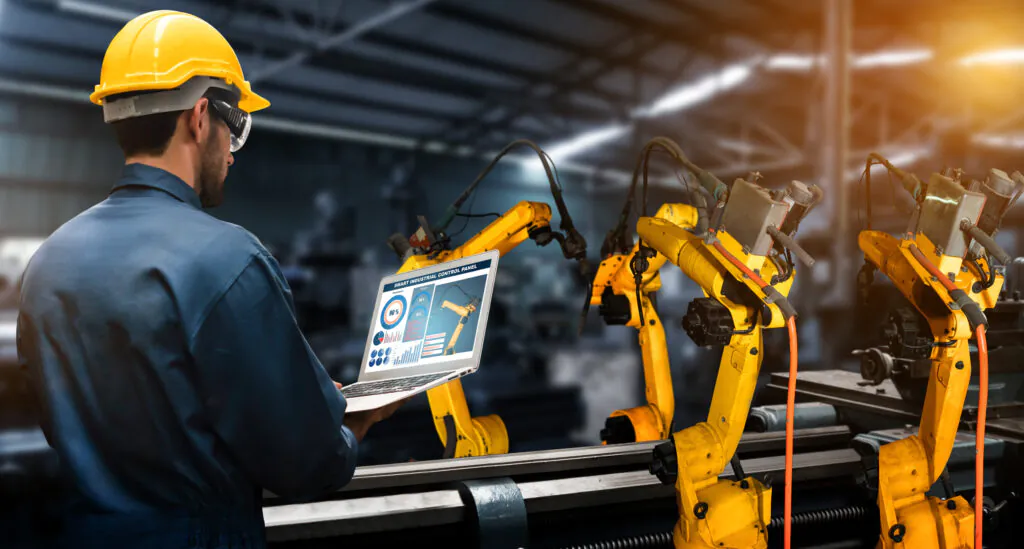Author: Sudeshna Ghosh
Introduction
Modern manufacturers cannot afford to ignore the challenges coming their way, considering the cut-throat competition and the rapidly rising market demands. According to experts at Infiniti Research, some of the key challenges faced by industrial equipment manufacturers include industrial equipment manufacturers can come across include an incomplete view of their profitability, lack of insight into the supply chain, and the means to collaborate productively across the various stakeholders. Although several industrial equipment manufacturing companies respond to these challenges by installing ERP systems, it may not be a complete solution to overcome these roadblocks.
What is Industrial Manufacturing Equipment?
Industrial manufacturing equipment refers to the large, durable machines and tools used in factories and industrial settings to produce goods. These machines are typically tougher, bigger, and designed for continuous heavy-duty use compared to consumer-grade equipment. Examples include industrial cranes, oil rigs, wind turbines, and specialized automated manufacturing machinery.
Types of Industrial Manufacturing Equipment
The manufacturing industry relies on a wide array of specialized equipment to efficiently produce goods. From metal cutting and forming machines to advanced robotics and 3D printers, each type of industrial manufacturing equipment plays a crucial role in transforming raw materials into finished products. Let’s explore some of the key types of machinery used in modern manufacturing:
-
Metal Cutting Machines:
Tools such as lathes, milling machines, and CNC machines are used for shaping and cutting many metal parts.
-
Metal Forming Machines:
Equipment for processes like bending, stamping, and forging, essential for creating metal components.
-
Robotics and Automation:
Automated machines that enhance production efficiency by performing repetitive tasks with precision.
-
Additive manufacturing:
Additive manufacturing technology that allows for rapid prototyping and on-demand production of complex parts.
-
Industrial Mold Equipment:
Machines used to create molds that shape materials into specific forms during product manufacturing processes.
Challenges Industrial Equipment Manufacturers Face
Industrial equipment manufacturers operate in a dynamic and competitive landscape, where they must navigate a variety of challenges to meet customer demands and maintain profitability. As technology evolves and market conditions shift, these manufacturers face increasing pressure to enhance their operational efficiency, service offerings, and customer satisfaction. Below are some of the key challenges that industrial equipment manufacturers encounter in their quest for success.
Errors in Quotation:
Inaccurate pricing estimates can lead to financial losses and diminished customer trust, impacting competitiveness.
Portfolio Management:
Effective management of service offerings is essential to align with customer needs and demonstrate value, driving satisfaction and revenue.
Service Flow:
Continuous engagement beyond project completion requires coordination of maintenance and repair services to maximize customer satisfaction.
Logistics Inconsistencies:
Disruptions in the movement of materials and equipment necessitate robust logistics solutions for efficient capacity planning and resource allocation.
Evolving Customer Expectations:
Manufacturers must adapt to rising demands for quality, convenience, and personalized service to remain competitive in the market.
Errors in quotation
The quotation is one of the foremost areas of focus for any business. An inaccurate quote or costing prevents businesses from making adequate profits as either all the elements are included or even the client can be lost due to high costs. Sales personnel need access to details so they can provide the right estimate and quote to their customers.
Portfolio management
Portfolio management for industrial equipment manufacturers includes creating premium support offerings, connecting service offers to business value, and launching new service offers. Making this challenge a priority will facilitate industrial equipment companies to take more responsibility for improving customer outcomes with offers and that would be required to prove their value in order to sell these offers.
Service flow
In most cases, the scope of work for manufacturing companies may not end with the project assembly or manufacture. It could further involve the transfer of project results to the base, which offers service opportunities like maintenance, repair, and overhaul services. This can cause several service integration issues for industrial manufacturers.
Logistics inconsistencies
Industrial equipment manufacturers have a considerable amount of equipment and materials that need to move from the factory floor to production operations. Without the right support, this could lead to severe logistics inconsistency and confusion for industrial equipment companies. Companies in the manufacturing sector need to implement a solution that would help them plan the capacity of the machine so that the person in charge can assign resources to the machines based on the requirement.
Evolving Customer Expectations
Industrial equipment manufacturers face increasing pressure to meet evolving customer expectations regarding product quality, convenience, and personalized service. Customers now demand faster delivery, tailored solutions, and exceptional support, which requires manufacturers to enhance their sales distribution strategies. To remain competitive, manufacturers must invest in technology and infrastructure that enable efficient order processing and inventory management while also prioritizing customer experience and satisfaction.
How to Overcome the Challenges Industrial Equipment Manufacturers Face
To effectively navigate the challenges faced by industrial equipment manufacturers, it is essential to implement strategic solutions that enhance operational efficiency, improve customer satisfaction, and drive profitability. Below are targeted solutions designed to address the key challenges in the industry:

- Enhanced Quotation Accuracy: Implement advanced quoting software that integrates real-time data and historical pricing to improve the accuracy of estimates. This reduces financial risks and builds customer trust by ensuring competitive and transparent pricing.
- Robust Portfolio Management: Develop a comprehensive service portfolio that aligns with customer needs, emphasizing premium support offerings. Regularly assess and adapt these services to demonstrate value and improve customer outcomes.
- Streamlined Service Flow: Integrate service delivery processes with project management systems to ensure seamless coordination of maintenance and repair services. This approach enhances customer engagement and maximizes satisfaction throughout the equipment lifecycle.
- Optimized Logistics Management: Adopt advanced logistics management systems that provide real-time tracking and analytics for materials and equipment. This helps address inconsistencies and improves supply chain efficiency, ensuring timely delivery and resource allocation.
- Adaptation to Customer Expectations: Invest in customer relationship management (CRM) systems to gather insights into customer preferences and behaviors. This enables manufacturers to tailor their offerings and enhance the overall customer experience, meeting the rising demands for quality and personalized service.
By implementing these solutions, industrial equipment manufacturers can effectively overcome challenges and position themselves for sustained success in a competitive market.
Here is how we helped an industrial equipment manufacturer boost profitability and customer satisfaction by improving quoting accuracy and logistics.
| Case Study: Overcoming Critical Challenges for an Industrial Equipment Manufacturer |
| Background: An industrial equipment manufacturer faced several critical challenges that hindered its operational efficiency and customer satisfaction. The company struggled with inaccurate quotations, ineffective portfolio management, service flow integration issues, logistics inconsistencies, and evolving customer expectations. These challenges not only impacted profitability but also threatened the company’s competitive position in the market. Recognizing the need for a strategic intervention, the manufacturer sought our expertise to implement tailored solutions. |
| Solution: To address the identified challenges, we implemented a comprehensive strategy that included the following solutions: 1. Enhanced Quotation Accuracy: We introduced an advanced quoting software that integrated real-time data and historical pricing, enabling the sales team to generate accurate estimates quickly. This reduced errors and improved customer trust. 2. Robust Portfolio Management: We assisted the manufacturer in developing a comprehensive service portfolio that aligned with customer needs. This included creating premium support offerings and launching new services to enhance value and customer satisfaction. 3. Streamlined Service Flow: We integrated the service delivery processes with project management systems, ensuring seamless coordination of maintenance and repair services. This approach maximized customer engagement and satisfaction throughout the equipment lifecycle. 4. Optimized Logistics Management: We adopted advanced logistics management solutions that provided real-time tracking and analytics for materials and equipment. This addressed inconsistencies and improved supply chain efficiency, ensuring timely delivery and resource allocation. 5. Adaptation to Customer Expectations: We implemented a customer relationship management (CRM) system that enabled the manufacturer to gather insights into customer preferences and behaviors. This allowed for tailored offerings and enhanced overall customer experience. |
| Results: The implementation of these solutions led to significant improvements for the industrial equipment manufacturer: 1. Increased Profitability: The enhanced quoting accuracy resulted in a 20% reduction in pricing errors, leading to improved profit margins. 2. Improved Customer Satisfaction: The robust portfolio management and streamlined service flow increased customer satisfaction scores by 30%, fostering loyalty and repeat business. 3. Enhanced Operational Efficiency: The optimized logistics management system reduced delivery times by 25%, improving overall supply chain performance. 4. Stronger Market Position: By adapting to evolving customer expectations, the manufacturer increased its market share, positioning itself as a leader in the industry. Through these strategic interventions, the industrial equipment manufacturer successfully overcame its critical challenges, enhancing its operational efficiency and ensuring long-term profitability in a competitive landscape. |
Conclusion
Industrial equipment manufacturers face critical challenges, including increasing manufacturing industry demands for innovative machines and equipment. Metal fabrication advancements are crucial, yet costly. Mining industries require robust and durable machinery, adding to the complexity. Ensuring the safety and integrity of industrial storage tanks is vital, while the efficiency of centrifuges and industrial mixers must be maximized. The shift towards sustainable energy impacts electric generators, necessitating greener solutions. Air compressors must evolve to meet energy efficiency standards. Efficient material handling equipment is essential for operational flow, and industrial packing equipment must keep pace with rapid technological advancements. Addressing these challenges is imperative for industry growth and competitiveness.


